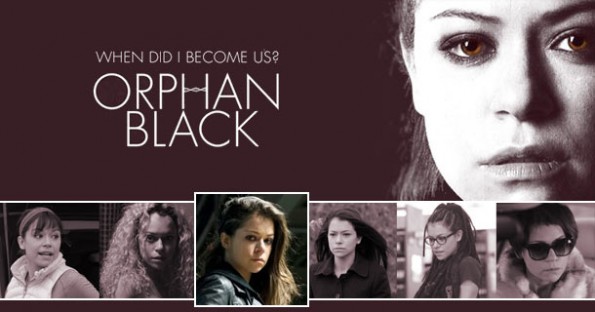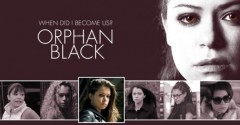Orphan Black is a new science fiction television show produced by BBC America and Space, starring Canadian actress Tatiana Maslany. I recently discovered this series, the first season of which just finished airing in the beginning of June 2013, and I plowed through all 10 episodes in two days. It’s a smart, complex, often dark yet at times quite funny, and well-paced show with a continuous narrative arc that explores the issues of identity and intellectual property. There is fine acting all around but the two standouts are Tatiana Maslany, who plays many roles on the show for which she deservedly won a Critics’ Choice Television Award for Best Actress in a Drama Series, and Jordan Gavaris, who plays the foster brother of one of Maslany’s characters.
Minor spoilers follow, but everything I mention is revealed in the first episode or featured prominently in the official publicity for the show.
The science fiction element of the show is pretty low key. You won’t see much in the way of futuristic technology in this series. Instead, the plot revolves around the controversial subject of human cloning and the early stages of body modification and genetic engineering. Who are we if we are not biologically unique, if there are others out there who are genetically identical to us? How much would our experiences and personal choices shape who we become despite this? What would you do if you encountered to your surprise not one but two or three or more other people who look exactly like you? What is it that makes us human? These are some of the questions explored in Orphan Black.
The series begins by introducing us to the main character of the show, Sarah Manning, played by Maslany. Sarah is an orphan, born in Great Britain, raised by a foster mother, and moved to Canada at an early age. Now a young woman, we meet her trying to escape a wild life of crime, drugs, and an abusive boyfriend. Sarah aims to get her life back together, reclaim custody of her daughter Kira from her foster mother Mrs. S, and scrounge up enough money to make a new life somewhere for herself, her daughter, and her foster brother Felix (played by Gavaris).
Things go south quickly, however. Mrs. S is skeptical that Sarah has really changed. And, while at a train station on her way home, Sarah witnesses a woman who looks exactly like her commit suicide by jumping in front of a train. A survivor and hustler, Sarah wastes little time recovering from the shock, spots an opportunity, and swiftly makes off with the dead woman’s purse. The plan at first is to sell the coke she stole from her boyfriend Vic and steal whatever else of value the dead woman owned. When she finds out Vic has come looking for her, pissed that she blindsided him and left him in the lurch with his dealer, Sarah decides to get rid of him by faking her own death, passing the dead body of her doppelganger off as her own and adopting the woman’s identity in order clean out her bank account. Then things get really complicated, and dangerous, as she meets more mirror images of herself and gets pulled deeper and deeper into the mystery surrounding their origins.
Tatiana Maslany gives us some phenomenal acting performances as she portrays as many as a half dozen distinct characters in the show, each with their own voices, accents, and mannerisms. She even pulls off roles within roles, convincingly portraying one clone impersonating another. Check out the behind-the-scenes video below to see how Maslany pulls off playing Sarah, soccer mom Alison, and evolutionary biology PhD student Cosima in a single scene:
MAJOR SPOILER ALERT
As you might have guessed from my opening paragraphs, Orphan Black also explores some issues of interest to libertarians. What should the legal status of clones be? Are they the property of their creators? Or do they have the same rights as natural-born rational beings? What if their genetic makeup is patented?
The nature of the organization that created Sarah and the other clones is not entirely clear. They appear to be a group of transhumanist fanatics devoted to the biological improvement of the species through genetic engineering. A private organization of some sort, not a government. I hope it doesn’t turn out to be a nefarious corporation. I’ve had enough of that tired, lazy, ideological straw man of a trope.
I do have one potentially significant criticism of the show. Human cloning is presented as illegal, yet this secretive organization has apparently patented the genes of the clones. The clones become convinced that the organization can claim to own them, including Sarah’s daughter (as a derivative product), not just their genetic pattern. They are further convinced that somehow signing some kind of mutually beneficial contract with the organization, one that affirms their independence and privacy in exchange for medical research testing (and in one case even employment), somehow solidifies that claim of ownership over their persons. This makes no sense to me unless the point is that the characters are simply mistaken, being ignorant of the law, or the show’s setting is meant to be more dystopian than our present-day reality.
I’m not sure what the legal status of human cloning and gene patents are in Canada, but in the United States it is illegal to clone human beings and the Supreme Court recently barred patenting human genes. Even if patents on human genes were legitimate, however, and they are not, whatever positive law says, it would not follow from this that human beings bearing patented genes are therefore the property of the patent owner.
END SPOILERS

I look forward to seeing how events play out in the second season. And there will be a second season. Unlike many an ill-fated scifi television show, Orphan Black has already been renewed.
Do check this show out. I highly recommend it.
Fair warning: there is some non-gratuitous nudity and sex; nothing near the level of Game of Thrones.
If you already watched the first season, please tell us what you think of it in the comments.
















Comments on this entry are closed.
Phatandy July 5, 2013 @ 8:12 pm | Link
I find the fact that this was filmed many months prior to the US Supreme Court ruling very interesting. Are you saying that the creators of OB should have known which way the Court would rule and so they shouldn’t have used this in their story? That’s how it sounds to me, then your “potentially significant criticism” would at least pass the WTF did he just say test. I mean if that’s what you believe I can except that as an opinion, even though I couldn’t disagree more strongly. Your use of the Court’s ruling in such a way so long after the fact is where I have “potentially significant criticism” with your review. It’s a wee bit senseless in IMHO. Clone Club Rocks
Geoffrey Allan Plauché July 5, 2013 @ 9:39 pm | Link
Hi Phatandy,
Thank you for taking the time to read my review and leave a comment.
That’s not what I was trying to say.
First, I think the show is fantastic and I gave it five out of five stars, which is something we’re pretty stingy about here.
The show is filmed in Toronto, Canada, so insofar as that is meant to be the show’s setting a US Supreme Court ruling would not apply. I brought up the ruling partly because, as you say, the timing is interesting. I guess these issues are on a lot of peoples’ minds right now.
I also brought it up to help make a point about what the legal status of human clones might be even if patents on human genes were legitimate (as it might be in Canada; I don’t know). What I was trying to say was that even if human gene patents are legitimate, this doesn’t mean that a human being bearing patented genetic material is therefore the property of the patent holder. I think the Canadian and US legal systems would both rule that human beings have rights to life, liberty, and property that trump those of the patent holder.
Now, it may turn out that the clones’ belief that the organization that made them can claim ownership over them boils down to ignorance of the law (none of them are IP lawyers) and this will be revealed later in the series. That would be great and it’d be a nice realistic detail. It’s why I added the “potential” qualifier. On the other hand, it could be that the show’s creators made a mistake about what then-current patent law entailed. It wouldn’t kill my enjoyment of the show, however, if they did make this mistake.
I hope this helps clarify my review for you.